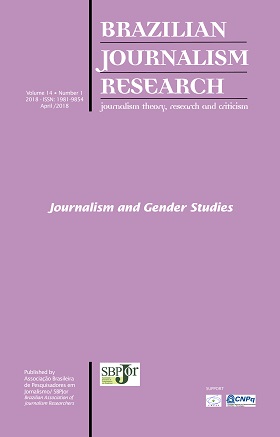Abstract
This paper aims to problematize some foundations of Western journalism in the light of feminist contributions, reflecting about the rape coverage made by dominant press, with the feature “A rape on campus”, published in November 2014 by the American magazine Rolling Stone, as case study. We propose to think journalism from four ideas linked to feminist theories: perspective; women's experience; objective in favor of women; and situated subjects. Besides reflect about a journalism built on feminist foundations, we are going to analyze the ways in which this journalism dialogues, collides, contradicts and challenges the traditional and universal foundations of journalism, especially those related to ethics and production.
Este artigo busca problematizar alguns fundamentos do jornalismo ocidental à luz das contribuições feministas, refletindo sobre a cobertura de estupro feita pela imprensa de referência, tendo a reportagem “A rape on campus”, publicada em novembro de 2014 pela revista norte-americana Rolling Stone, como estudo de caso. Nos propomos a pensar o jornalismo a partir de quatro proposições ligadas às teorias feministas: perspectiva; experiência das mulheres; objetivo em/a favor das mulheres; e sujeitos situados. Para além de pensar um jornalismo possível a partir de fundamentos feministas, nos dedicamos a cotejar de que maneiras essa potência de jornalismo dialoga, se choca, contradiz e interpela fundamentos tradicionais e universais do jornalismo, sobretudo aqueles relativos à ética e aos processos de apuração.
Este artículo busca problematizar algunos fundamentos del periodismo occidental a la luz de las contribuciones feministas, pensando sobre la cobertura de violación hecha por la prensa de referencia, teniendo el reportaje “A rape on campus”, publicada en noviembre de 2014 por la revista norteamericana Rolling Stone, como estudio de caso. Nos proponemos pensar el periodismo a partir de cuatro proposiciones ligadas a las teorías feministas: perspectiva; experiencia de las mujeres; objetivo en favor de las mujeres; y sujetos situados. Además de pensar un periodismo posible a partir de fundamentos feministas, nos dedicamos a cotejar de qué maneras esa potencia de periodismo dialoga, choca, contradice e interpela fundamentos tradicionales y universales del periodismo, sobre todo aquellos relativos a la ética y los derechos procesos de escrutinio.
References
Alexiévitch, S. (2016). A guerra não tem rosto de mulher. São Paulo: Companhia das Letras.
Bandeira, A. P. B. da S. (2016). Jornalismo feminino e jornalismo feminista: aproximações e distanciamentos. Vozes e Diálogo, v. 14, n. 2, pp. 190-199. Retrieved from: https://siaiap32.univali.br/seer/index.php/vd/article/view/8167/4804.
Buitoni, D. H. S. (1981). Mulher de papel: a representação da mulher pela imprensa feminina brasileira. São Paulo: Loyola.
Carpeggiani, S. (2017). Da mulher que não teme ser contestada. Suplemento Pernambuco, v. 138, p.12-17, August, 2017. Retrieved from: http://www.suplementopernambuco.com.br/images/pdf/PE_138_web.pdf.
Connell, R. (2015). Gênero: uma perspectiva global. São Paulo: inVersos.
Coronel, S.; Coll, S.; Kravitz, D. (2015). Anatomy of a journalistic failure. Rolling Stone, New York, v. 1233. Retrieved from: www.rollingstone.com/culture/features/a-rape-on-campus-what-went-wrong-20150405.
Erdely, S. R. (2014). A rape on campus: A Brutal Assault and Struggle for Justice at UVA. Rolling Stone, Nova York, v. 1223. Retrieved from: https://goo.gl/dR7PXk.
Flax, J. (1991). Pós-modernismo e as relações de gênero na teoria feminista. In H. B. Hollanda (Ed.), Pós-modernismo e política (pp. 217-250). Rio de Janeiro: Rocco.
Fraser, N. (2013). Fortunes of feminism. From state-managed capitalism to neoliberal crisis. London, New York: Verso.
Garcia-Rojas, C. (2012). Reporting on rape and sexual violence. A Media Toolkit for Local and National Journalists to Better Media Coverage. Chicago, Chicago Taskforce on Violence Against Girls & Young Women. Retrieved from: chitaskforce.org/wp/wp-content/uploads/2012/10/Chicago-Taskforce-Media-Toolkit.pdf.
Harding, S. (1987). Is there a feminist method? In S. Harding (Ed.), Feminism and methodology (pp. 1-14). Bloomington/Indianapolis: Indiana University Press.
Kolodny, A. (1980). Dancing through the minefield: some observations on the theory, practice and politics of a feminist literary criticism. Feminist Studies, Maryland, v. 6, n. 1, pp. 1-25. Retrieved from: https://www.jstor.org/stable/3177648?seq=1#page_scan_tab_contents.
Lauretis, T. De (1984). Alice doesn't: Feminism, semiotics, cinema. Bloomington: Indiana University Press.
Machado, M. B. (2006). Jornalismo e perspectivas de enunciação: uma abordagem metodológica. Revista Intexto, v 1, n 14, pp. 1-11. Retrieved from: http://seer.ufrgs.br/index.php/intexto/article/view/4251.
Miguel, L. F.; Biroli, F. (2010). A produção da imparcialidade: a construção do discurso universal a partir da perspectiva jornalística. Revista Brasileira de Ciências Sociais, São Paulo, v. 25, n° 73, p. 59-76. Retrieved from: http://www.scielo.br/pdf/rbcsoc/v25n73/v25n73a04.pdf.
MS. (USA) (Ed.) (2017). About: Ms. HerStory: 1971-Present. 2017. Retrieved from: http://msmagazine.com/blog/about.
Nye, A. (1995). Teoria feminista e as filosofias do homem. Rio de Janeiro: Record, Rosa dos tempos.
Perrot, M. (2007). Minha história das mulheres. São Paulo: Contexto.
Park, R. (1976). A notícia como forma de Conhecimento. In C. Steinberg (Ed), Meios de comunicação de massa (pp.168-185). São Paulo: Cultrix.
Rivers, N. (2017). Postfeminism(s) and the arrival of the fourth wave: Turning tides. Cheltenham: Palgrave Macmillan.
RODRIGUES, C. (2016). Erguer, acumular, quebrar, varrer, erguer…. Serrote. São Paulo, n. 26. Retrieved from: https://www.revistaserrote.com.br/2017/01/erguer-acumular-quebrar-varrer-erguer-por-carla-rodrigues.
Souza, A. M. F. de L. e (2011). Sobre gênero e ciência: tensões, avanços, desafios. In A. Bonneti and A. M. F. de L. Souza (Eds.), Gênero, mulheres e feminismos (pp. 15-28). Salvador: Edufba, Neim.
Spinoza (2010). Ética. Belo Horizonte: Autêntica.
Copyright for articles published in this journal is retained by the authors, with first publication rights granted to the journal. By virtue of their appearance in this open access journal, articles are free to use, with proper attribution, in educational and other non-commercial settings.
This work is licensed under a Creative Commons Attribution-NonCommercial-NoDerivatives 4.0 International License.


